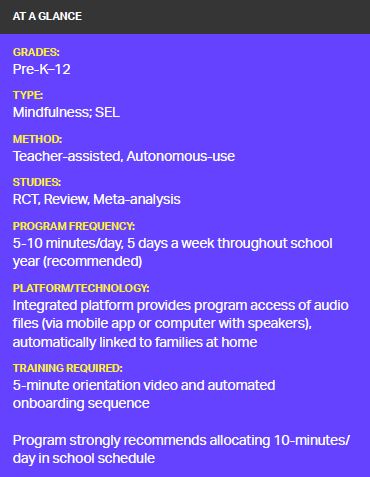 Inner Explorer™ program offers simple to implement, audio-guided mindfulness programming that helps Pre-K-12 students, their teachers, and families experience less stress, greater focus, and improved self-regulation. As a result, behavior issues are reduced and academic performance is increased. Inner Explorer ™ was co-founded and received 501(c)(3) nonprofit status in 2012 by long-time education and mindfulness researchers and practitioners Laura S. Bakosh, Ph.D. and Janice L. Houlihan, M.Ed. The program uses daily 5- to 10-minute audio-guided sessions to help students develop self-awareness, better manage negative emotions, and ready themselves for learning. Themes covered in the program follow mindfulness-based stress reduction (MBSR) and social and emotional learning (SEL) formats which include breathing and relaxation practice, awareness of self, of senses and thoughts, regulating emotions and behavior, focusing attention, and cultivating compassion and connection.
Inner Explorer™ program offers simple to implement, audio-guided mindfulness programming that helps Pre-K-12 students, their teachers, and families experience less stress, greater focus, and improved self-regulation. As a result, behavior issues are reduced and academic performance is increased. Inner Explorer ™ was co-founded and received 501(c)(3) nonprofit status in 2012 by long-time education and mindfulness researchers and practitioners Laura S. Bakosh, Ph.D. and Janice L. Houlihan, M.Ed. The program uses daily 5- to 10-minute audio-guided sessions to help students develop self-awareness, better manage negative emotions, and ready themselves for learning. Themes covered in the program follow mindfulness-based stress reduction (MBSR) and social and emotional learning (SEL) formats which include breathing and relaxation practice, awareness of self, of senses and thoughts, regulating emotions and behavior, focusing attention, and cultivating compassion and connection.
Inner Explorer ™ is an easy and accessible way for teachers to bring mindfulness into the classroom and offer daily mindfulness practice. The program is designed to promote compassion, gratitude and self-regulation, and improve focus. It can be used in the context of any school subject or setting, such as classroom, after school, or youth detention center, and has specific trainings and tools to involve parents and families. The Tune-In feature allows parents and caregivers to access all the audio practices for home use and offers the opportunity for family members to receive an email when the class is pausing in the day to use the audio mindfulness practice. This allows families to practice too, listening to the same audio file. The program is intended to build a community of mindfulness practitioners among students, families, teachers, and administrators, positively impacting school and home culture and climate.
The format is a selection of 90 pre-recorded, on-demand guided audio mindfulness practices by age group, with narrators from diverse ethnic backgrounds. Teachers do not need to plan or prep, rather log-in and play the next sequenced practice. The program has been shown to address challenges many school districts face, including low academic performance and graduation rates, discipline problems, negative school climate, and bullying. Because teachers participate with students, it also reduces their stress and improves well-being and efficacy.
An administrative dashboard gives teachers and administrators the ability to see usage analytics by classroom to assess impact compared to key academic measures. No formal training is required; teachers can learn how to use Inner Explorer ™ through a brief orientation video. The audio collection is available with a 1-year or longer license.
The program is currently reaching 820,000 students in 3,200 schools. The Pre-K, elementary, and middle school programs are also available in Spanish (with High School in development). Inner Explorer ™ is included in the CASEL Guide to Effective Social and Emotional Learning Programs as a designated “SEL-Related Approach.”
OVERVIEW: https://innerexplorer.org/
WEBINAR/VIDEO/DEMO: Audio samples in English and Spanish https://innerexplorer.org/compass/ourProgram
CONTACT: https://innerexplorer.org/compass/contactUs
FOR PROFESSIONAL DEVELOPMENT: info@innerexplorer.org
KEY STUDIES SUMMARY:
An 8-week study of 191 third graders used a pre-recorded, 10-minute-per-day, audio-guided program. Teachers were instructed to play one audio track, in sequence 1–35, each school day.They were guided to select a normal transition time to run the program, for instance, after recess or lunch. During the last 2 minutes of each 10-minute recording, students were instructed, while still quiet, to take out their journals and write or draw about their experience with the practice that day in order to integrate any insights. Results found significant improvement in reading and science academic performance, as well as a 50% reduction in disruptive behavior
(Bakosh, L., Snow, R., Tobias, J., Houlihan, J., & Barbosa- Leiker, C. (2015). Maximizing Mindful Learning: An Innovative Mindful Awareness Intervention Improves Elementary School Students’ Quarterly Grades. Mindfulness, doi: 10.1007/s12671-015-0387- 6) http://meditationfreedom.com/wp-content/uploads/2015/10/Bakosh-Houlihan-2015-Maximizing-Mindful-Learning.pdf
OTHER RESEARCH AVAILABLE:
Bakosh, L. S., Tobias Mortlock, J. M., Querstret, D., & Morison, L. (2018). Audio-guided mindfulness training in schools and its effect on academic attainment: Contributing to theory and practice. Learning and Instruction, 58, 34-41. http://dx.doi.org/10.1016/j.learninstruc.2018.04.012
Maynard, B., Solis, M., Miller, V., & Brenden, K. (2017). Mindfulness-Based Interventions for Improving Cognition, Academic Achievement, Behavior, and Socioemotional Functioning of Primary and Secondary School Students. Campbell Collaboration. doi: 10.4073/csr.2017.5.
Semple, R., Droutman, V., & Reid, B. (2016). Mindfulness goes to school: Things learned (so far) from research and real-world experiences. Psychology in the Schools, 54(1), 29-52. doi: 10.1002/ pits.21981 https://www.ncbi.nlm.nih.gov/pmc/articles/PMC5405439/